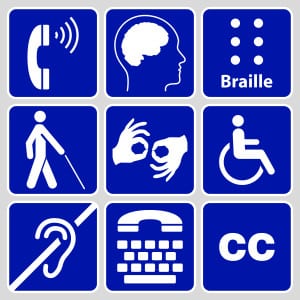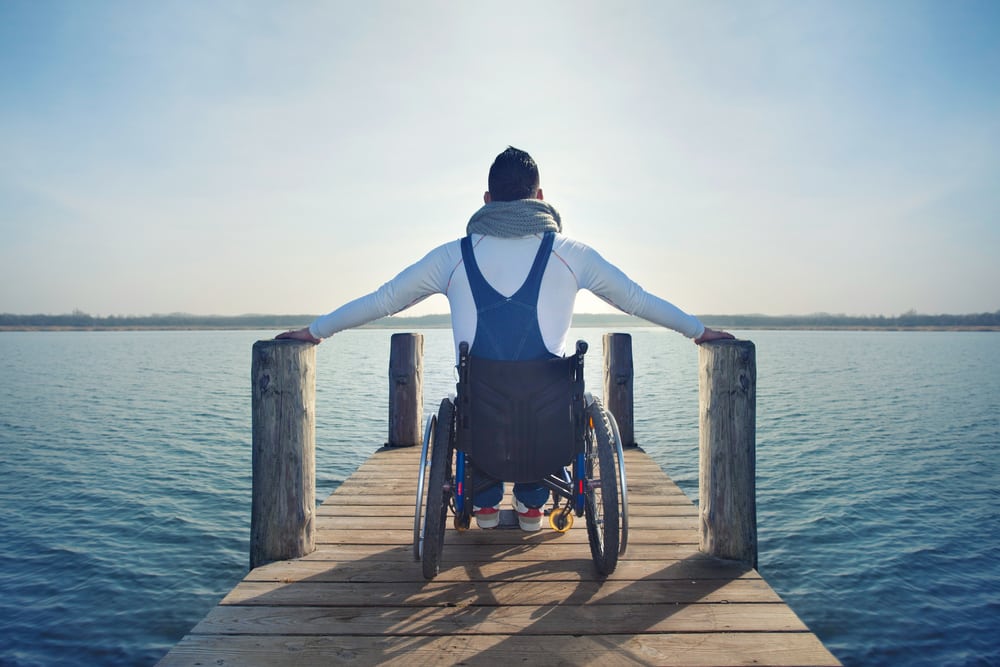 First: Call the airline ahead of time. Explain your disability to them and let them know what you can and cannot do. Also, provide them with the type of accommodation you may need. The airline wants to help you. The airline will either help you right away or provide you with directions on how to receive accessible accommodations at the airport.
Second: Call the TSA. They have a printable card that you bring with you to security so that you may go through an alternate screening. You are still getting a thorough screening, but it caters to how you need to be accommodated. Don’t worry that you’ll be forced to do this alone, TSA and airlines allow you to travel with a companion.
Third: Explain your situation to a crew member at the gate and when you get on the plane talk to the flight attendants. The reason for this is if you have an emergency while the seat belt sign is on, it is better for them to know ahead of time. They want to keep you safe and to do that you need to let them help you. Don’t worry about judgment or sounding silly. They have heard it all!
Fourth: Be understanding! Airports are typically high stress environments for airline workers and fellow travelers. By being understanding of the hectic environment you are entering, airline employees have a better opportunity to help you with your accommodations.
Fifth: Leave your doctor’s notes at home. Flight attendants, airports, bus stations, and even theme parks will not ask you for a doctor’s note or to “prove” your disability in accordance to the ADA. Sometimes that can be challenging because not all disabilities are visible. So describe it, if you really feel like the note will help you, bring it but most places won’t even glance at it. Which ties back to “what should I say?”
What should you say? Simply writing it down can be the most helpful. At times, being considered a person with disabilities can be embarrassing or uncomfortable. Everyone is human and we all have feelings. Writing can be the best tool so express everything you want to say and what you want to communicate. You can also brief your traveling companion on how to deal with awkward situations. In my experience, what you say and how you say it is most powerful. That’s why it’s important to know what you want to communicate ahead of time.
Sixth: Make sure to bring all of your medications in your carry-on or personal bag. You may want to make sure that you have all of your over the counter or prescription medications with you. Putting them in their own small bag within a carry-on can make things easier for screening. Sometimes, not always, they may check those drugs for names and expiration dates so make sure everything is up to date. Before traveling, try to get all of your medications refilled. If it’s before you are ready for a refill, reach out to your pharmacy, sometimes they can act as an advocate for you.
Lastly: Have a plan. If an emergency arises, know where to go and who to talk to. Also be aware of what hospitals and clinics are available to you in that area. Don’t panic. Have a plan B, C, and even D to get you where you are going in a safe way. You might also want to consider purchasing trip insurance. Many trip insurance policies will cover the cost of cancelling if you have a health issue before leaving, and provide medical assistance if you have an issue while traveling.
If you still have questions about traveling with disabilities, feel free to call Customer Support and they’ll be glad to help you book your trip and answer questions.
First: Call the airline ahead of time. Explain your disability to them and let them know what you can and cannot do. Also, provide them with the type of accommodation you may need. The airline wants to help you. The airline will either help you right away or provide you with directions on how to receive accessible accommodations at the airport.
Second: Call the TSA. They have a printable card that you bring with you to security so that you may go through an alternate screening. You are still getting a thorough screening, but it caters to how you need to be accommodated. Don’t worry that you’ll be forced to do this alone, TSA and airlines allow you to travel with a companion.
Third: Explain your situation to a crew member at the gate and when you get on the plane talk to the flight attendants. The reason for this is if you have an emergency while the seat belt sign is on, it is better for them to know ahead of time. They want to keep you safe and to do that you need to let them help you. Don’t worry about judgment or sounding silly. They have heard it all!
Fourth: Be understanding! Airports are typically high stress environments for airline workers and fellow travelers. By being understanding of the hectic environment you are entering, airline employees have a better opportunity to help you with your accommodations.
Fifth: Leave your doctor’s notes at home. Flight attendants, airports, bus stations, and even theme parks will not ask you for a doctor’s note or to “prove” your disability in accordance to the ADA. Sometimes that can be challenging because not all disabilities are visible. So describe it, if you really feel like the note will help you, bring it but most places won’t even glance at it. Which ties back to “what should I say?”
What should you say? Simply writing it down can be the most helpful. At times, being considered a person with disabilities can be embarrassing or uncomfortable. Everyone is human and we all have feelings. Writing can be the best tool so express everything you want to say and what you want to communicate. You can also brief your traveling companion on how to deal with awkward situations. In my experience, what you say and how you say it is most powerful. That’s why it’s important to know what you want to communicate ahead of time.
Sixth: Make sure to bring all of your medications in your carry-on or personal bag. You may want to make sure that you have all of your over the counter or prescription medications with you. Putting them in their own small bag within a carry-on can make things easier for screening. Sometimes, not always, they may check those drugs for names and expiration dates so make sure everything is up to date. Before traveling, try to get all of your medications refilled. If it’s before you are ready for a refill, reach out to your pharmacy, sometimes they can act as an advocate for you.
Lastly: Have a plan. If an emergency arises, know where to go and who to talk to. Also be aware of what hospitals and clinics are available to you in that area. Don’t panic. Have a plan B, C, and even D to get you where you are going in a safe way. You might also want to consider purchasing trip insurance. Many trip insurance policies will cover the cost of cancelling if you have a health issue before leaving, and provide medical assistance if you have an issue while traveling.
If you still have questions about traveling with disabilities, feel free to call Customer Support and they’ll be glad to help you book your trip and answer questions. 
Traveling With Disabilities
Having tips on how to make travel more accessible can be valuable information, especially when 1 in 5 Americans are living with a disability. Everyone should be able to experience the joy that travel brings. Whether you have a disability or you are traveling with someone who has a disability, initially you may you may have a million questions racing through your head, such as “What should I do?”, “Where should I go?” and “What should I say?”. Not all disabilities mean that someone is physically or mentally impaired, some are invisible to the eye. So here are a few tips to make your trip easier.
 First: Call the airline ahead of time. Explain your disability to them and let them know what you can and cannot do. Also, provide them with the type of accommodation you may need. The airline wants to help you. The airline will either help you right away or provide you with directions on how to receive accessible accommodations at the airport.
Second: Call the TSA. They have a printable card that you bring with you to security so that you may go through an alternate screening. You are still getting a thorough screening, but it caters to how you need to be accommodated. Don’t worry that you’ll be forced to do this alone, TSA and airlines allow you to travel with a companion.
Third: Explain your situation to a crew member at the gate and when you get on the plane talk to the flight attendants. The reason for this is if you have an emergency while the seat belt sign is on, it is better for them to know ahead of time. They want to keep you safe and to do that you need to let them help you. Don’t worry about judgment or sounding silly. They have heard it all!
Fourth: Be understanding! Airports are typically high stress environments for airline workers and fellow travelers. By being understanding of the hectic environment you are entering, airline employees have a better opportunity to help you with your accommodations.
Fifth: Leave your doctor’s notes at home. Flight attendants, airports, bus stations, and even theme parks will not ask you for a doctor’s note or to “prove” your disability in accordance to the ADA. Sometimes that can be challenging because not all disabilities are visible. So describe it, if you really feel like the note will help you, bring it but most places won’t even glance at it. Which ties back to “what should I say?”
What should you say? Simply writing it down can be the most helpful. At times, being considered a person with disabilities can be embarrassing or uncomfortable. Everyone is human and we all have feelings. Writing can be the best tool so express everything you want to say and what you want to communicate. You can also brief your traveling companion on how to deal with awkward situations. In my experience, what you say and how you say it is most powerful. That’s why it’s important to know what you want to communicate ahead of time.
Sixth: Make sure to bring all of your medications in your carry-on or personal bag. You may want to make sure that you have all of your over the counter or prescription medications with you. Putting them in their own small bag within a carry-on can make things easier for screening. Sometimes, not always, they may check those drugs for names and expiration dates so make sure everything is up to date. Before traveling, try to get all of your medications refilled. If it’s before you are ready for a refill, reach out to your pharmacy, sometimes they can act as an advocate for you.
Lastly: Have a plan. If an emergency arises, know where to go and who to talk to. Also be aware of what hospitals and clinics are available to you in that area. Don’t panic. Have a plan B, C, and even D to get you where you are going in a safe way. You might also want to consider purchasing trip insurance. Many trip insurance policies will cover the cost of cancelling if you have a health issue before leaving, and provide medical assistance if you have an issue while traveling.
If you still have questions about traveling with disabilities, feel free to call Customer Support and they’ll be glad to help you book your trip and answer questions.
First: Call the airline ahead of time. Explain your disability to them and let them know what you can and cannot do. Also, provide them with the type of accommodation you may need. The airline wants to help you. The airline will either help you right away or provide you with directions on how to receive accessible accommodations at the airport.
Second: Call the TSA. They have a printable card that you bring with you to security so that you may go through an alternate screening. You are still getting a thorough screening, but it caters to how you need to be accommodated. Don’t worry that you’ll be forced to do this alone, TSA and airlines allow you to travel with a companion.
Third: Explain your situation to a crew member at the gate and when you get on the plane talk to the flight attendants. The reason for this is if you have an emergency while the seat belt sign is on, it is better for them to know ahead of time. They want to keep you safe and to do that you need to let them help you. Don’t worry about judgment or sounding silly. They have heard it all!
Fourth: Be understanding! Airports are typically high stress environments for airline workers and fellow travelers. By being understanding of the hectic environment you are entering, airline employees have a better opportunity to help you with your accommodations.
Fifth: Leave your doctor’s notes at home. Flight attendants, airports, bus stations, and even theme parks will not ask you for a doctor’s note or to “prove” your disability in accordance to the ADA. Sometimes that can be challenging because not all disabilities are visible. So describe it, if you really feel like the note will help you, bring it but most places won’t even glance at it. Which ties back to “what should I say?”
What should you say? Simply writing it down can be the most helpful. At times, being considered a person with disabilities can be embarrassing or uncomfortable. Everyone is human and we all have feelings. Writing can be the best tool so express everything you want to say and what you want to communicate. You can also brief your traveling companion on how to deal with awkward situations. In my experience, what you say and how you say it is most powerful. That’s why it’s important to know what you want to communicate ahead of time.
Sixth: Make sure to bring all of your medications in your carry-on or personal bag. You may want to make sure that you have all of your over the counter or prescription medications with you. Putting them in their own small bag within a carry-on can make things easier for screening. Sometimes, not always, they may check those drugs for names and expiration dates so make sure everything is up to date. Before traveling, try to get all of your medications refilled. If it’s before you are ready for a refill, reach out to your pharmacy, sometimes they can act as an advocate for you.
Lastly: Have a plan. If an emergency arises, know where to go and who to talk to. Also be aware of what hospitals and clinics are available to you in that area. Don’t panic. Have a plan B, C, and even D to get you where you are going in a safe way. You might also want to consider purchasing trip insurance. Many trip insurance policies will cover the cost of cancelling if you have a health issue before leaving, and provide medical assistance if you have an issue while traveling.
If you still have questions about traveling with disabilities, feel free to call Customer Support and they’ll be glad to help you book your trip and answer questions.
 First: Call the airline ahead of time. Explain your disability to them and let them know what you can and cannot do. Also, provide them with the type of accommodation you may need. The airline wants to help you. The airline will either help you right away or provide you with directions on how to receive accessible accommodations at the airport.
Second: Call the TSA. They have a printable card that you bring with you to security so that you may go through an alternate screening. You are still getting a thorough screening, but it caters to how you need to be accommodated. Don’t worry that you’ll be forced to do this alone, TSA and airlines allow you to travel with a companion.
Third: Explain your situation to a crew member at the gate and when you get on the plane talk to the flight attendants. The reason for this is if you have an emergency while the seat belt sign is on, it is better for them to know ahead of time. They want to keep you safe and to do that you need to let them help you. Don’t worry about judgment or sounding silly. They have heard it all!
Fourth: Be understanding! Airports are typically high stress environments for airline workers and fellow travelers. By being understanding of the hectic environment you are entering, airline employees have a better opportunity to help you with your accommodations.
Fifth: Leave your doctor’s notes at home. Flight attendants, airports, bus stations, and even theme parks will not ask you for a doctor’s note or to “prove” your disability in accordance to the ADA. Sometimes that can be challenging because not all disabilities are visible. So describe it, if you really feel like the note will help you, bring it but most places won’t even glance at it. Which ties back to “what should I say?”
What should you say? Simply writing it down can be the most helpful. At times, being considered a person with disabilities can be embarrassing or uncomfortable. Everyone is human and we all have feelings. Writing can be the best tool so express everything you want to say and what you want to communicate. You can also brief your traveling companion on how to deal with awkward situations. In my experience, what you say and how you say it is most powerful. That’s why it’s important to know what you want to communicate ahead of time.
Sixth: Make sure to bring all of your medications in your carry-on or personal bag. You may want to make sure that you have all of your over the counter or prescription medications with you. Putting them in their own small bag within a carry-on can make things easier for screening. Sometimes, not always, they may check those drugs for names and expiration dates so make sure everything is up to date. Before traveling, try to get all of your medications refilled. If it’s before you are ready for a refill, reach out to your pharmacy, sometimes they can act as an advocate for you.
Lastly: Have a plan. If an emergency arises, know where to go and who to talk to. Also be aware of what hospitals and clinics are available to you in that area. Don’t panic. Have a plan B, C, and even D to get you where you are going in a safe way. You might also want to consider purchasing trip insurance. Many trip insurance policies will cover the cost of cancelling if you have a health issue before leaving, and provide medical assistance if you have an issue while traveling.
If you still have questions about traveling with disabilities, feel free to call Customer Support and they’ll be glad to help you book your trip and answer questions.
First: Call the airline ahead of time. Explain your disability to them and let them know what you can and cannot do. Also, provide them with the type of accommodation you may need. The airline wants to help you. The airline will either help you right away or provide you with directions on how to receive accessible accommodations at the airport.
Second: Call the TSA. They have a printable card that you bring with you to security so that you may go through an alternate screening. You are still getting a thorough screening, but it caters to how you need to be accommodated. Don’t worry that you’ll be forced to do this alone, TSA and airlines allow you to travel with a companion.
Third: Explain your situation to a crew member at the gate and when you get on the plane talk to the flight attendants. The reason for this is if you have an emergency while the seat belt sign is on, it is better for them to know ahead of time. They want to keep you safe and to do that you need to let them help you. Don’t worry about judgment or sounding silly. They have heard it all!
Fourth: Be understanding! Airports are typically high stress environments for airline workers and fellow travelers. By being understanding of the hectic environment you are entering, airline employees have a better opportunity to help you with your accommodations.
Fifth: Leave your doctor’s notes at home. Flight attendants, airports, bus stations, and even theme parks will not ask you for a doctor’s note or to “prove” your disability in accordance to the ADA. Sometimes that can be challenging because not all disabilities are visible. So describe it, if you really feel like the note will help you, bring it but most places won’t even glance at it. Which ties back to “what should I say?”
What should you say? Simply writing it down can be the most helpful. At times, being considered a person with disabilities can be embarrassing or uncomfortable. Everyone is human and we all have feelings. Writing can be the best tool so express everything you want to say and what you want to communicate. You can also brief your traveling companion on how to deal with awkward situations. In my experience, what you say and how you say it is most powerful. That’s why it’s important to know what you want to communicate ahead of time.
Sixth: Make sure to bring all of your medications in your carry-on or personal bag. You may want to make sure that you have all of your over the counter or prescription medications with you. Putting them in their own small bag within a carry-on can make things easier for screening. Sometimes, not always, they may check those drugs for names and expiration dates so make sure everything is up to date. Before traveling, try to get all of your medications refilled. If it’s before you are ready for a refill, reach out to your pharmacy, sometimes they can act as an advocate for you.
Lastly: Have a plan. If an emergency arises, know where to go and who to talk to. Also be aware of what hospitals and clinics are available to you in that area. Don’t panic. Have a plan B, C, and even D to get you where you are going in a safe way. You might also want to consider purchasing trip insurance. Many trip insurance policies will cover the cost of cancelling if you have a health issue before leaving, and provide medical assistance if you have an issue while traveling.
If you still have questions about traveling with disabilities, feel free to call Customer Support and they’ll be glad to help you book your trip and answer questions. 









